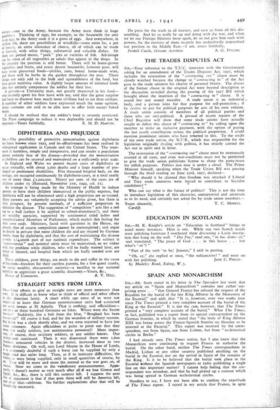DIPHTHERIA AND PREJUDICE
Sts,—The possibility of protective immunisation against diphtherin has been known since 1923, and its-effectiveness has been realised in widespread application in Canada and the United States. The treat- ment is harmless, simple and inexpensive, and can render a population almost entirely free of the disease—provided that the immunisation of children can be secured and maintained on a sufficiently wide scale. In England and Wales we permit 6o,000 cases of diphtheria to occur annually, with about 3,000 deaths and a large number of pro- longed or permanent disabilities. Five thousand hospital beds, on the average, are occupied continuously by diphtheria-cases, at a total yearly cost of more than £1,000,000. Ninety per cent, of the cases are of children under 15 (Hansard, November 21st, 1940, col. t).
An attempt is being made by the Ministry of Health to induce parents to have their children immunised at the public expense, but diphtheria will not be eliminated until a high proportion are so treated. Many parents are voluntarily accepting the advice given, but there is little prospect, by present methods, of a sufficient proportion to eliminate the disease. The suggestion of "compulsion" acts like a red rag to a bull (unless it be applied to school-attendance!), and there are wealthy agencies, supported by sentimental titled ladies and unsophisticated Members of Parliament, which exploit this feeling for their own ends. Ministers, faced with questions in the House, say pously that of course compulsion cannot be contemplated ; and argue no doubt in private that more children die and are injured by German bombs than by diphtheria, and that the cost of maintaining the disease IS only 5/4,000th part of our national expenditure. The subject is "controversial" and national unity must be maintained, so we tinker with the problem while children, who will be badly wanted later, are billed or injured, and hospital beds which are badly needed now are filled.
These children, poor things, are made to die and suffer in the cause of freedom--freedom for their careless parents, for a few queef cranks, for some wealthy obscurantist societies—a sacrifice to our national inability to appreciate a great scientific discovery.—Yours, &c.,


























 Previous page
Previous page